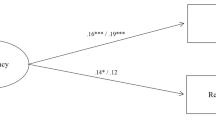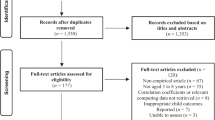Abstract
The first year of college can be a difficult developmental transition for many students, although it is also a time of personal growth and maturation. Little is known about how self-regulation abilities mature across this transition, nor whether maturation predicts better adjustment across the first year. We investigated the development of three self-regulation abilities (constructive thinking, emotional regulation, and mastery) and relations of this development to adjustment (depression, anxiety, and stress) in a sample of 162 first-year students. Data were gathered at two time points: just prior to their attendance at a large public northeastern university and then again at the end of the first year. Results indicated that, on average, students did not increase in their constructive thinking or emotion regulation abilities and actually decreased in their sense of mastery. In bivariate analyses, increases in all three self-regulation abilities were related to better adjustment across the year, effects that remained when examined simultaneously in multiple regression analyses. Further, analyses showed that change in self-regulation abilities, rather than mean levels per se, predicted changes in adjustment over the first year. Implications for interventions to assist students in the development of these self-regulation skills in regard to adjustment are discussed.
Similar content being viewed by others
References
Adams, T. B., Wharton, C. M., Quilter, L., & Hirsch, T. (2008). The association between mental health and acute infectious illness among a national sample of 18- to 24-year-old college students. Journal of American College Health, 56, 657–664.
Ammerman, R., Lynch, K., Donovan, J., Martin, C., & Maisto, S. (2001). Constructive thinking in adolescents with substance use disorders. Psychology of Addictive Behaviors, 15, 89–96.
Andrews, B., & Wilding, J. (2004). The relation of depression and anxiety to life-stress and achievement in students. British Journal of Psychology, 95, 509–521.
Antony, M., Bieling, P., Cox, B., Enns, M., & Swinson, R. (1998). Psychometric properties of the 42-item and 21-item versions of the Depression Anxiety Stress Scales in clinical groups and a community sample. Psychological Assessment, 10, 176–181.
Arnett, J. J. (2000). Emerging adulthood. A theory of development from the late teens through the twenties. American Psychologist, 55, 469–480.
Aspinwall, L. G., & Taylor, S. E. (1992). Modeling cognitive adaptation: A longitudinal investigation of the impact of individual differences and coping on college adjustment and performance. Journal of Personality and Psychology, 63, 989–1003.
Baumeister, R. F., Schmeichel, B. J., & Vohs, K. D. (2007). Self-regulation and the executive function: The self as controlling agent. In A. W. Kruglanski & E. T. Higgins (Eds.), Social psychology: Handbook of basic principles (pp. 516–539). New York: Guilford.
Bovier, P. A., Chamot, E., & Perneger, T. V. (2004). Perceived stress, internal resources, and social support as determinants of mental health among young adults. Quality of Life Research, 13, 161–170.
Brissette, I., Scheier, M. F., & Carver, C. S. (2002). The role of optimism in social network development, coping, and psychological adjustment during a life transition. Journal of Personality and Social Psychology, 82, 102–111.
Chickering, A. W., & Reisser, L. (1993). Education and identity (2nd ed.). San Francisco: Jossey-Bass Publishers.
Cisler, J. M., Olatunji, B. O., Feldner, M. T., & Forsyth, J. P. (2010). Emotion regulation and the anxiety disorders: An integrative review. Journal of Psychopathology and Behavioral Assessment, 38, 68–82.
Cooper, D. L., Healy, M. A., & Simpson, J. (1994). Student development through involvement: Specific changes over time. Journal of College Student Development, 35, 98–102.
Dag, I. (1999). The relationships among paranormal beliefs, locus of control and psychopathology in a Turkish college sample. Personality and Individual Differences, 26, 723–737.
Deckro, G., Ballinger, K., Hoyt, M., Wilcher, M., Dusek, J., Myers, P., et al. (2002). The evaluation of a mind/body intervention to reduce psychological distress and perceived stress in college students. Journal of American College Health, 50, 281–287.
Dyson, R., & Renk, K. (2006). Freshmen adaptation to university life: Depressive symptoms, stress, and coping. Journal of Clinical Psychology, 62, 1231–1244.
Epstein, S. (1992). Coping ability, negative self-evaluation, and overgeneralization: Experiment and theory. Journal of Personality and Social Psychology, 62, 826–836.
Epstein, S., & Meier, P. (1989). Constructive thinking: A broad coping variable with specific components. Journal of Personality and Social Psychology, 57, 332–350.
Evans, N. J. (2003). Psychosocial, cognitive, and typological perspectives on student development. In S. R. Komives & D. R. Woodard Jr (Eds.), Student services: A handbook for the profession (pp. 179–202). San Francisco: Jossey-Bass.
Fischer, J. L., Forthun, L. F., Pidcock, B. W., & Dowd, D. A. (2007). Parent relationships, emotion regulation, psychosocial maturity and college student alcohol use problems. Journal of Youth and Adolescence, 36, 912–926.
Fontana, A. M., Hyra, D., Godfrey, L., & Cermak, L. (1999). Impact of a peer-led stress inoculation training intervention on state anxiety and heart rate in college students. Journal of Applied Biobehavioral Research, 4, 45–63.
Garnefski, N., Kraaij, V., & Spinhoven, P. (2001). Negative life events, cognitive emotion regulation and emotional problems. Personality and Individual Differences, 8, 1311–1327.
Gratz, K. L., & Roemer, L. (2004). Multidimensional assessment of emotion regulation and dysregulation: Development, factor structure, and initial validation of the Difficulties in Emotion Regulation Scale. Journal of Psychopathology and Behavioral Assessment, 26, 41–54.
Griffin, D., Murray, S., & Gonzales, R. (1999). Difference score correlations in relationship research: A conceptual primer. Personal Relationships, 6, 505–518.
Gross, J. J., & Munoz, R. F. (1995). Emotion regulation and mental health. Clinical Psychology Science and Practice, 2, 151–164.
Guiffrida, D. (2009). Theories of human development that enhance an understanding of the college transition process. Teacher College Record, 111, 2419–2443.
Henry, J., & Crawford, J. (2005). The short-form version of the Depression Anxiety Stress Scales (DASS-21): Construct validity and normative data in a large non-clinical sample. British Journal of Clinical Psychology, 44, 227–239.
Holder, E. E., & Levi, D. J. (1988). Mental health and locus of control: SCL-90-R and Levenson’s IPC scales. Journal of Clinical Psychology, 44, 753–755.
Lachman, M. E. (2006). Control: Perceived control over aging-related declines: Adaptive beliefs and behaviors. Current Directions in Psychological Science, 15, 282–286.
Lang, F., & Heckhausen, J. (2006). Motivation and interpersonal regulation across adulthood: Managing the challenges and constraints of social contexts. In C. H. Hoare (Ed.), Handbook of adult development and learning (pp. 149–166). New York: Oxford University Press.
Lapsley, D. K., & Edgerton, J. (2002). Separation-individuation, adult attachment style, and college adjustment. Journal of Counseling and Development, 80, 484–492.
Liu, Q., Shono, M., & Kitamura, T. (2009). Psychological well-being, depression, and anxiety in Japanese university students. Depression and Anxiety, 26, 99–105.
Lopes, P. N., Salovery, P., Côté, S., Beers, M., & Petty, R. E. (2005). Emotion regulation abilities and the quality of social interaction. Emotion, 5, 113–118.
Lopez, F. G., Watkins, C. E., Manus, M., & Hunton-Shoup, J. (1992). Conflictual independence, mood regulation, and generalized self-efficacy: Test of a model of late-adolescent identity. Journal of Counseling Psychology, 39, 375–381.
Lovibond, P. F., & Lovibond, S. H. (1995). The structure of negative emotional states: Comparison of the depression anxiety stress scales (DASS) with the beck depression and anxiety inventories. Behaviour Research and Therapy, 33, 335–343.
Lu, L. (1994). University transition: Major and minor life stressors, personality characteristics and mental health. Psychological Medicine, 24, 81–87.
Martijn, C., Tenbult, P., Merckelbach, H., Dreezens, E., & De Vries, N. K. (2002). Getting a grip on ourselves: Challenging expectancies about loss of energy after self-control. Social Cognition, 20, 441–460.
Mennin, D. S., Heimberg, R. G., Turk, C. L., & Fresco, D. M. (2005). Preliminary evidence for an emotion dysregulation model of generalized anxiety disorder. Behaviour Research and Therapy, 43, 1281–1310.
Park, C., & Grant, C. (2005). Determinants of positive and negative consequences of alcohol consumption in college students: Alcohol use, gender, and psychological characteristics. Addictive Behaviors, 30, 755–765.
Pascarella, E. T., & Terenzini, P. T. (2005). How college affects students: A third decade of research. San Francisco: Jossey-Bass.
Pearlin, L., & Schooler, C. (1978). The structure of coping. Journal of Health and Social Behavior, 19, 2–21.
Pritchard, M. E., Wilson, G. S., & Yamnitz, B. (2007). What predicts adjustment among college students? A longitudinal panel study. Journal of American College Health, 56, 15–22.
Rawson, H., Bloomer, K., & Kendall, A. (1994). Stress, anxiety, depression, and physical illness in college students. Journal of Genetic Psychology, 155, 321–330.
Richman, J., & Flaherty, J. (1985). Coping and depression: The relative contribution of internal and external resources during a life cycle transition. The Journal of Nervous and Mental Disease, 173, 590–595.
Rubio, C. T., & Lubin, B. (1986). College student mental health: A person-environment interactional analysis. Journal of Clinical Psychology, 42, 205–212.
Sasaki, M., & Yamasaki, K. (2007). Stress coping and the adjustment process among university freshman. Counseling Psychology Quarterly, 20, 51–67.
Scheuer, E., & Epstein, S. (1997). Constructive thinking, reactions to a laboratory stressor, and symptoms in everyday life. Anxiety, Stress & Coping: An International Journal, 10, 269–303.
Sher, K. J., Wood, P. K., & Gotham, H. J. (1996). The course of psychological distress in college: A prospective high-risk study. Journal of College Student Development, 37, 42–51.
Spector, P., Chen, P., & O’Connell, B. (2000). A longitudinal study of relations between job stressors and job strains while controlling for prior negative affectivity and strains. Journal of Applied Psychology, 85, 211–218.
Srivastava, S., Tamir, M., McGonigal, K. M., John, O. P., & Gross, J. J. (2009). The social costs of emotional suppression: A prospective study of the transition to college. Journal of Personality and Social Psychology, 96, 883–897.
Steinhardt, M., & Dolbier, C. (2008). Evaluation of a resilience intervention to enhance coping strategies and protective factors and decrease symptomatology. Journal of American College Health, 56, 445–453.
Steunenberg, B., Beekman, A., Deeg, D., Bremmer, M., & Kerkhof, A. (2007). Mastery and neuroticism predict recovery of depression in later life. The American Journal of Geriatric Psychiatry, 15, 234–242.
Tamir, M., John, O. P., Srivastava, S., & Gross, J. J. (2007). Implicit theories of emotion: Affective and social outcomes across a major life transition. Journal of Personality and Social Psychology, 92, 731–744.
Tanner, J. L. (2006). Recentering during emerging adulthood: A critical turning point in life span human development. In J. J. Arnett & J. L. Tanner (Eds.), Emerging Adults in America. Coming of age in the 21st century (pp. 21–35). Washington, DC: American Psychological Association.
University of Connecticut (2011). http://www.oir.uconn.edu/FactBook08_09.html. Accessed July 2, 2011.
Verger, P., Combes, J. B., Kovess-Masfety, V., Choquet, M., Guagliardo, V., Rouillon, F., et al. (2009). Psychological distress in first year university students: Socioeconomic and academic stressors, mastery and social support in young men and women. Social Psychiatry and Psychiatric Epidemiology, 44, 643–650.
Wei, M., Russell, D., & Zakalik, R. (2005). Adult attachment, social self-efficacy, self- disclosure, loneliness, and subsequent depression for freshman college students: A longitudinal study. Journal of Counseling Psychology, 52, 602–614.
Williams, L., Gatt, J., Hatch, A., Palmer, D., Nagy, M., Rennie, C., et al. (2008). The INTEGRATE model of emotion, thinking and self regulation: An application to the “paradox of aging”. Journal of Integrative Neuroscience, 7, 367–404.
Younger, J., Finan, P., & Zautra, A. (2008). Personal mastery predicts pain, stress, fatigue, and blood pressure in adults with rheumatoid arthritis. Psychology & Health, 23, 515–535.
Zhou, M., Yang, X.-H., & Xie, F.-F. (2007). Survey on the influential factors of subjective well-being in 1348 students in 8 universities of Jiangxi province. Journal of Clinical Rehabilitative Tissue Engineering Research, 11, 3288–3290.
Author information
Authors and Affiliations
Corresponding author
Rights and permissions
About this article
Cite this article
Park, C.L., Edmondson, D. & Lee, J. Development of Self-regulation Abilities as Predictors of Psychological Adjustment Across the First Year of College. J Adult Dev 19, 40–49 (2012). https://doi.org/10.1007/s10804-011-9133-z
Published:
Issue Date:
DOI: https://doi.org/10.1007/s10804-011-9133-z




